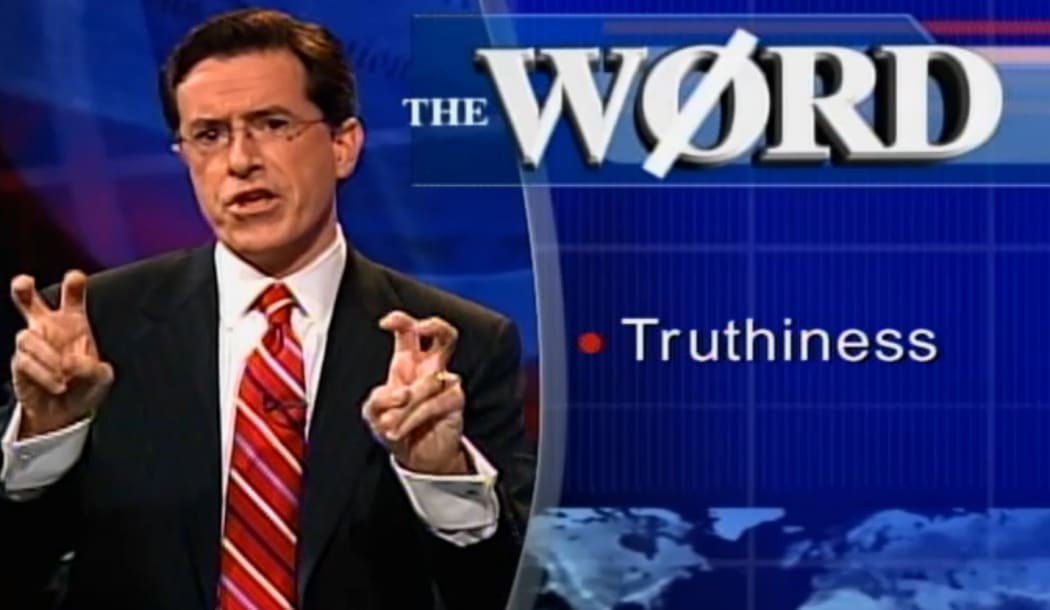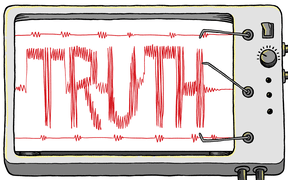Oxford Dictionaries has declared "post-truth" as its 2016 international word of the year, reflecting what it called a "highly-charged" political 12 months.
It is defined as an adjective relating to circumstances in which objective facts are less influential in shaping public opinion than emotional appeals.
Its selection follows June's Brexit vote and the US presidential election.

US comedian Stephen Colbert introducing his concept of "truthiness" - similar to "post-truth", in which emotions matter more than facts. Photo: screenshot
Oxford Dictionaries' Casper Grathwohl said post-truth could become "one of the defining words of our time".
Post-truth, which has become associated with the phrase "post-truth politics", was chosen ahead of other political terms, including "Brexiteer" and "alt-right" from a shortlist selected to reflect the social, cultural, political, economic and technological trends and events of the year.
Oxford Dictionaries says post-truth is thought to have been first used in 1992.
However, it says the frequency of its usage increased by 2,000% in 2016 compared with last year.
Mr Grathwohl said: "Fuelled by the rise of social media as a news source and a growing distrust of facts offered up by the establishment, post-truth as a concept has been finding its linguistic footing for some time," he said.
"We first saw the frequency really spike this year in June with buzz over the Brexit vote and again in July when Donald Trump secured the Republican presidential nomination.
"Given that usage of the term hasn't shown any signs of slowing down, I wouldn't be surprised if post-truth becomes one of the defining words of our time."
Dr Claire Hardaker, lecturer in forensic linguistics at Lancaster University, said "freak moments" that get people talking were key to the creation of new words.
"When you look back at the dictionary, you get some words that are a spasm of history and they very quickly fall out of use," she said. "They are fashionable, they are trendy and they die.
"Others live on and become part of our language. But it is very unpredictable."
Last year, Oxford Dictionaries chose a "pictograph" as its word of the year for the first time.
It said the "face with tears of joy emoji" best represented "the ethos, mood, and preoccupations of 2015".
The 2016 shortlist:
- Adulting - The practice of behaving in a way characteristic of a responsible adult, especially the accomplishment of mundane but necessary tasks
- Alt-right - An ideological grouping associated with extreme conservative or reactionary viewpoints, characterized by a rejection of mainstream politics and by the use of online media to disseminate deliberately controversial content
- Brexiteer - A person who is in favour of the UK withdrawing from the European Union
- Chatbot - A computer program designed to simulate conversation with human users, especially over the internet
- Coulrophobia - Extreme or irrational fear of clowns
- Glass cliff - Used with reference to a situation in which a woman or member of a minority group ascends to a leadership position in challenging circumstances where the risk of failure is high
- Hygge - A quality of cosiness and comfortable conviviality that engenders a feeling of contentment or well-being, regarded as a defining characteristic of Danish culture
- Latinx - A person of Latin American origin or descent, used as a gender-neutral or non-binary alternative to Latino or Latina
- Woke - Originally in African-American usage meaning alert to injustice in society, especially racism
- BBC



